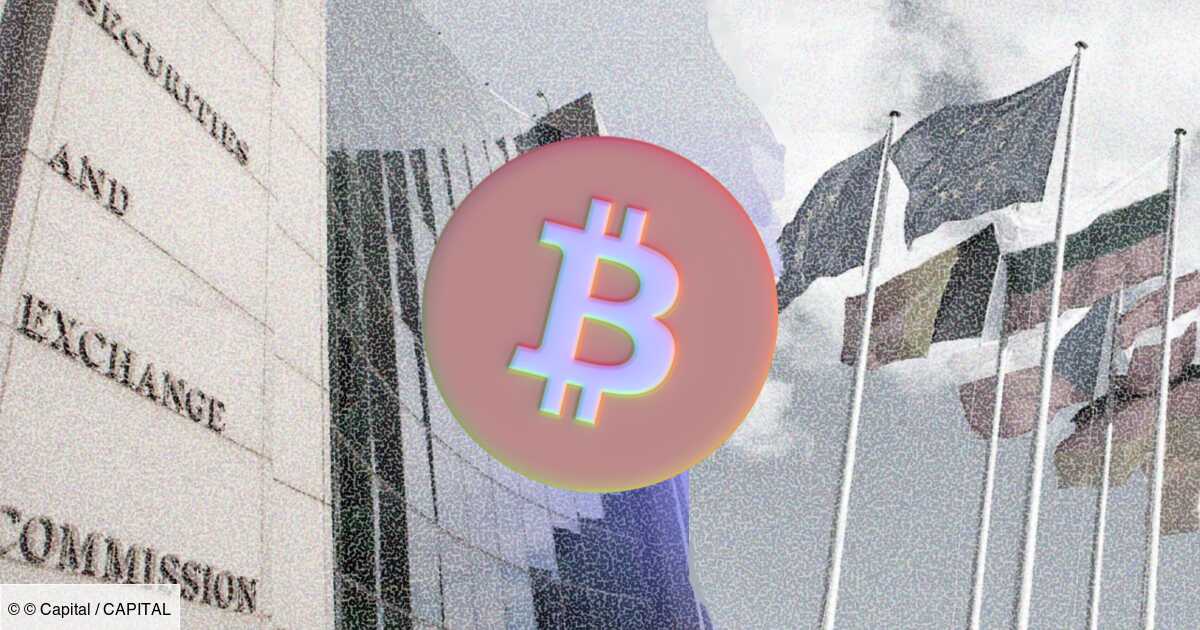
© © Capital
– Bitcoin, SEC, European flags
The SEC, the commissioner of the American Stock Exchange, has finally resigned: after more than a decade of successive refusals, the American regulator has finally authorized the launch of Bitcoin funds listed on the stock exchange, mainly under pressure from Blackrock . the largest asset manager in the world.
For the US market, this decision means that individuals can now invest in Bitcoin through traditional financial services offered by banks, brokers and management consultants, such as life insurance or the local retirement savings plan. “This ETF will be available from all financial management companies. Companies whose customers are often over 60 years old and don’t necessarily feel comfortable navigating today’s electronic platforms to purchase bitcoin. They now have an easy way to invest in Bitcoin. underlines Cyril Sabbagh, director of the financial management company Melanion Capital.
A new typology of buyers for the crypto asset, which could represent an estimated contribution of between $14 and $39 billion over the next three years according to investment firm Galaxy Digital, and up to $100 billion this year according to Standard Chartered Bank. In one month since launch, these Bitcoin ETFs have already made a total of approximately $9.5 billion in net purchases, an amount in line with previous projections.
Bitcoin ETFs are still banned in Europe, but…
However, European customers are not directly affected: such a financial product is even prohibited for them. In Europe, an ETF must be diversified and backed by regulated assets, but Bitcoin does not belong to the European Union. However, there are financial products, such as the ETF of the firm Melanion Capital, which concentrates shares of companies exposed to crypto assets, or even ETPs, such as that of Coinshares, consisting of stocks and bonds.
Shock of supply and demand with the halve of Bitcoin
Indirectly, on the other hand, the marketing of these financial products in the United States should have an impact on European investors and speculators. “This ETF will bring an influx of liquidity to bitcoin, brings up Cyril Sabbagh. This should result in a rise in Bitcoin, so mechanically this impact on the price also concerns the entire world and therefore also Europeans.
A view shared by Laurent Ovion, director of innovation & crypto at savings and asset manager DLPK. “The simple fact that these ETFs are being brought to market indicates buying pressure. This causes a demand shock, which complements the supply shock that will occur in April halving (the automatic update of Bitcoin, which will halve the issuance of new bitcoins, NLR). From a fundamental perspective, it is reasonable to assume that the price will at least remain stable or increase.”
A better view of Bitcoin among the traditional financial world?
But more than Bitcoin’s future valuation, Laurent Ovion believes above all that this decision will change the traditional financial sector’s perception of this crypto asset. “The boss of a major French bank like Nicolas Théry will no longer be able to afford a lunar exit on Bitcoin, as he did again in the press a few months agohe said in reference to the president of Crédit Mutuel Alliance Fédérale who had contributed to this The cross cryptocurrency to “crime” and with “money laundering”. So, the relationship between traditional finance and the Web3 ecosystem should be normalized”, he believes. An important point, as certain banks always see with an evil eye the purchase of bitcoins by their customers.
But even if Cyril Sabbagh believes the arrival of spot Bitcoin ETFs in the United States is a threat “change of era” for the cryptoactives, Laurent Ovion is more measured and avoids the term “revolution” As far as, “This type of investment product has existed in Europe since 2015”.
